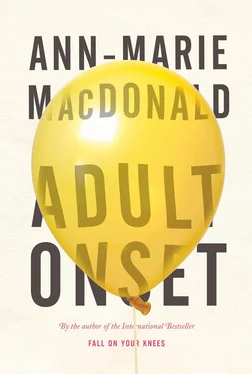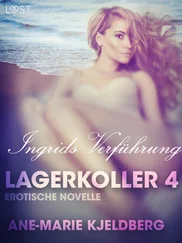“Shereen left, eh,” he says, and closes the car door with a substantial Bavarian thunk.
The kids mob him, Daisy dances him up the flagstones, administering kisses of bovine heft.
“Where’s she off to this time?”
“She left left.”
“Oh.”
“It’s okay,” he says, beeping the car locked. “I’ve healed.”
The scent of the Euro-male is upon him: coffee, cigarettes, cologne pour lui . He joins them for grilled cheese sandwiches, tomato soup, broccoli and real-fruit freezie pops. He plays hide-and-seek and horsey all over the house and even helps with bath time, reading to the children afterwards— Here Come the Aliens! before “tuckling” them in — his hybrid of tucking and tickling . He heads back downstairs, and Mary Rose goes about settling them in the wake of their uncle’s stimulating glamour — even Matthew’s hamster is up and running early in its metal wheel, while the expiring balloons from his fifth birthday party have revived to float above the floor, riding the gusts of hilarity. One nudges her as she sits on the edge of her son’s bed in the darkness and she bats it away — God bless Balloon King and their money’s-worth helium. He is cuddled with beloved Bun, the tattered lapinary recipient of many a grooming by Daisy. She rubs her little boy’s back and he sighs contentedly. “You brushed the cloud away, Mumma.”
“I brushed away the balloon, sweetheart.”
“It was a cloud on my back.”
“Is it gone now?”
“You brushed it away.”
Surely he is too young to be burdened by a “cloud.” He says spooky things sometimes, I remember the first time I got born … Maybe he is psychic. Or maybe he is just sad. He has already been dealt a blow. Anna’s heartbeat, her voice and rhythm, the scent of his birth mother. Then, gone. On his dresser is a photo of her with the big striped circus tent in the background; she is decked out in safety vest and hard hat, waving. Gone to myth. It’s all for the best, but somewhere he must remember the loss, in his cells. He knows what it is to be haunted. But he also knows how to be consoled. She winds his glass unicorn and it tinkles its tune.
She goes into Maggie’s room, leans over the side of the crib and tucks the duvet around her shoulders. Maggie kicks it off. “Milk,” she says, ominously.
Mary Rose gives in and brings her a bottle. Just this once. She tries to cuddle her, but Maggie does not wish to be held. At least not by Mumma. She claims the bottle and rolls onto her side.
From the outset Mary Rose was less able to console her daughter than her son. To a degree this was natural — Hil was Maggie’s biological mother and was breastfeeding. Mary Rose understood this was what fathers often felt: second fiddle not only in the mother’s but the baby’s affections, despite long nights of walking the floor with her infant. Her own father walked the floor with her in the wee hours for the first several weeks — months? — while her mother was kept in hospital. Despite his gender and generation, he mothered her during the crucial early time, with the result that, for her, his body was the soft one, his voice, his gaze, safe in his arms on the balcony at sunset, Good night, sweetie pie. See you in the morning … Mary Rose herself has been the very model of a modern Other Mother: supportive at the birth, game for night feedings, endlessly patient while she waited for the honeymoon to resume with Hil. And waited.
She hears Andy-Pat downstairs playing the theme from A Charlie Brown Christmas on the piano — it’s almost Easter, maybe he could use a foot calendar. Her arm feels too warm. She dekes into the bathroom and pops an Advil — although, considering the pain in her arm is all in her head, she ought to be popping a placebo.
At the kitchen table she pours them each a Scotch. He says, “Want to see the birthday present I got for Shereen?”
“Why are you buying her a present if you’ve broken up, what are you hoping to achieve?” She kicks herself for lapsing into lecture mode again — the guy is forty-three years old even if he is her baby brother.
“Just ask me to show you her present.”
“Okay, show me her present.”
He holds out his wrist and flashes his chunky new TAG Heuer watch.
“What about the BMW?”
“Oh that’s not retail therapy, that’s a necessity.” He leans forward, conspiratorial. “It’s a cheap lease, okay? This mechanic, I may have mentioned him, Slavko, who was looking after the Hyundai?” A warm smile breaks across his boyish face. “He’s this great huge bear of a man, eh, totally foul-mouthed, could snap you in half, but the type of guy’d give you the shirt off his back, you know? So he puts me in touch with this dealership that’s essentially virtual, okay?” His tone becomes brisk, manly. “They don’t keep any actual cars on any one lot, they move them around as needed, so zero overhead, which is good news for me.” He sits back, nonchalant, and rests his gaze on a corner of the ceiling.
Mary Rose knows that look, it is her father’s look, she used to cultivate it herself to advantage — the old still-waters-run-deep look. As far as she can tell, it masks chronic low-grade dissociation and self-deceit, but her brother gets away with it because he’s a guy — it even helps him get laid. He does look great, though. Both he and Mary Rose have an advantage in the conventional good looks department: their mother has a schnozz, their father sports a beak, their older sister boasts a Roman profile, but the two youngest, by some stroke of recessive luck, have cute little noses. Maybe it goes with the lucky blood type.
While Andy-Patrick has his share of good looks, however, it is the glint in his eye that makes him attractive, and it is back. Gone are the saggy chinos, the faded fleece of Christmas Past, along with five or six pounds. He is wearing a hip new T-shirt with a silk-screened vintage coffee ad, Diesel jeans and a groovy cowboy belt. He’s had a total heartbreak-over.
He narrows his eyes— Bond, James Bond —“I’m getting my hair done Wednesday, just some discreet highlights, want to come?”
He is a liaison officer with the Royal Canadian Mounted Police, which seems to mean he can show up for work when he wants but has to be ready to don his scarlets and head for a podium at a moment’s notice. People don’t think cops go in for retail therapy of the sumptuary kind. A new snowmobile or flat-screen TV, sure, but hair? Great-ass jeans? “Look, I’m not going to sit here and drop the C-bomb like some guys I know, but Shereen is … you know, she’s young, she’s got stuff to do, she’s a … she’s not a bitch just because she left me.”
“The C-bomb?”
He grins. “I’m watching The Sopranos again, eh, it’s my therapy.”
“I know, it’s so comforting.”
“I know, weird, eh? So I’m not going to sit here and call her a—” He gives an apologetic wince that reminds her of their father, then mouths the word, cunt . Which does not.
She sips. “What did you mean, you’ve ‘healed’?”
He flashes a roguish smile in answer.
She deadpans, “Do the words ‘Gerald McBoing-Boing’ mean anything to you?”
“I’m not on the rebound, Mister, this one’s strictly … recreational.”
“Is that why Shereen left?”
“No. No, no, no way, this postdates that.”
She waits for the “tell.” He scratches his cheek. Vindicated, she inquires, “Do we bother with names?”
“Naw, she’s nice, but …”
“How old is she?”
“She’s a big fan of yours.”
“Please tell me she’s at the twenty-five-year-old end of the YA readership spectrum.” She has spoken with asperity but suppresses a vicarious macho buzz — as if she were chalking up a sexual conquest of her own.
Читать дальше












